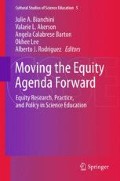Abstract
In the last four decades, we have made tremendous social, technological, and scientific advances. We have the Civil Rights Act. We have explored the moon and are now making plans to explore Mars. We have completely mapped the human genome. We have also made computers smaller, faster, and smarter. Yet, during this same period, we have not been able to close the student achievement gap. How is this possible when the science education research community has produced so much knowledge clearly describing the social, cultural, and institutional factors that obstruct and/or facilitate equal access to educational opportunities (National Academy of the Sciences [NAS] 2010; Rodriguez 2004)?
The original version of this chapter was revised. An erratum to this chapter can be found at http://dx.doi.org/10.1007/978-94-007-4467-7_23
Access this chapter
Tax calculation will be finalised at checkout
Purchases are for personal use only
References
California Mathematics and Science Partnerships (CaMSP). (2011). California Department of Education. Sacramento: Author. Downloaded June, 2011, http://www.cde.ca.gov/pd/ca/ma/camspintrod.asp
Freire, P. (1970). Pedagogy of the oppressed. New York: The Continuum Publishing Group.
Hoffmann-Barthes, A., Nair, S., & Malpede, D. (1999). Scientific, technical and vocational education of girls in Africa: Summary of 21 national reports. Paris: UNESCO. Section for Science and Technology Education. http://www.worldcat.org/search?q=au%3AHoffmann-Barthes%2C+Anna+Maria.&qt=hot_author
Jacinto, C. (2010). Recent trends in technical education in Latin America. Paris, France: UNESCO International Institute for Educational Planning. www.iiep.unesco.org.
Lather, P. (1991). Getting smart: Feminist research and pedagogy with/in the postmodern. New York: Routledge.
National Academy of the Sciences [NAS]. (2010). Expanding underrepresented minority participation: America’s science and technology talent at the crossroads (A research report co-sponsored by the Committee on Underrepresented Groups and the Expansion of Science and Engineering Workforce Pipeline; Committee on Science, Engineering, and Public Policy; Policy and Global Affairs; National Academy of Sciences, National Academy of Engineering, Institute of Medicine). Washington, DC: National Academies Press. Available from http://www.nap.edu/catalog/12984.html
No Child Left Behind Act of 2001, Pub. L. No. 107–110, 115 Stat. 1425. (2002). Retrieved September 1, 2010, from http://www.ed.gov/legislation/ESEA02/
Oakes, J. (1990). Multiplying inequalities: The effect of race, social class, and tracking on opportunities to learn mathematics and science. Santa Monica: RAND Corporation.
Rodriguez, A. (2004). Turning despondency into hope: Charting new paths to improve students’ achievement and participation in science education. Greensboro: The Southeast Eisenhower Regional Consortium for Mathematics and Science Education at SERVE. http://www.serve.org/FileLibraryDetails.aspx?id=83
Rodriguez, A. J. (2008). When does the researcher (should) also become a resource for the bricoleur teacher? A review of Ajay Shama’s Portrait of a science teacher as bricoleur: A case study from India. Cultural Studies of Science Education, 3(4), 867–873.
Rodriguez, A. J., & Kitchen, R. (2005). Preparing prospective mathematics and science teachers to teach for diversity: Promising strategies for transformative pedagogy. Mahwah: Lawrence Erlbaum Associates.
U.S. Census Bureau. (2010). U.S. Census Bureau. Washington, DC: U.S. Census Bureau. Retrieved June 21, 2010, from http://www.census.gov/
Author information
Authors and Affiliations
Corresponding author
Editor information
Editors and Affiliations
Rights and permissions
Copyright information
© 2013 Springer Science+Business Media Dordrecht
About this chapter
Cite this chapter
Rodriguez, A.J. (2013). Epilogue: Moving the Equity Agenda Forward Requires Transformative Action. In: Bianchini, J.A., Akerson, V.L., Barton, A.C., Lee, O., Rodriguez, A.J. (eds) Moving the Equity Agenda Forward. Cultural Studies of Science Education, vol 5. Springer, Dordrecht. https://doi.org/10.1007/978-94-007-4467-7_22
Download citation
DOI: https://doi.org/10.1007/978-94-007-4467-7_22
Publisher Name: Springer, Dordrecht
Print ISBN: 978-94-007-4466-0
Online ISBN: 978-94-007-4467-7
eBook Packages: Humanities, Social Sciences and LawEducation (R0)

